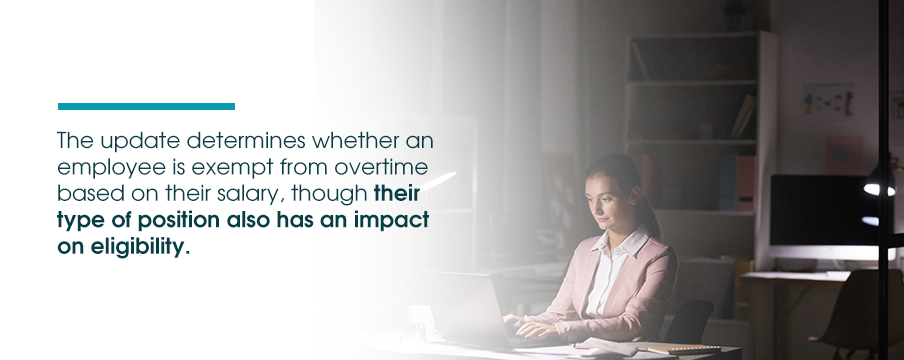By Weisberg Cummings, P.C. on February 21st, 2020
You work hard at your job, even putting in extra hours. When you work those longer hours, you may ask yourself, “Should I be paid overtime?” In some cases, the answer is yes, but there are exemptions to overtime wages. As of 2020, these exemptions have changed.
Whether you had an understanding of the previous Pennsylvania overtime eligibility or you never knew about such state and federal exemptions, you need to understand the federal and Pennsylvania overtime wage laws update as of 2020. With this knowledge, you’ll be able to answer that critical question — am I eligible for overtime payment?
Overtime Law Definitions
Before you learn about the federal and Pennsylvania overtime wage laws update for 2020, there are some terms that will improve your understanding of the update. Familiarize yourself with these terms and phrases associated with overtime law:
- The Fair Labor Standards Act (FLSA): The FLSA establishes standards for overtime as well as other wage and employment topics from minimum wage to recordkeeping.
- Work: The FLSA considers work or work time as most of the time you spend conducting work-related business. Work can occur at an employer’s location, a prescribed workplace or on duty at other locations.
- Off-the-clock: Activities performed off-the-clock may fall under work time if they are related to your position’s duties. These activities may occur on or off the job site and can include voluntary or involuntary actions. Examples include cleaning up, staying late after regular hours without putting in for overtime, working through meals, making job-related calls or filling out job-related paperwork at home.
- Overtime: In most cases, the FLSA defines overtime as the time you work beyond 40 hours in a workweek.
- Workweek: One workweek consists of 168 hours in a seven consecutive day period. Your employer chooses what day of the week a workweek begins. You cannot consider two or more workweeks when calculating overtime because one workweek stands alone.
- FLSA overtime rate: The FLSA defines the overtime rate as no less than one and a half times your regular pay rate. If you made $7.25 an hour, your overtime pay would be at least $10.88.
- Exempt from overtime: Employees who meet certain requirements may not have to receive overtime pay under the FLSA’s standards for overtime.
Those terms will improve your understanding of the new federal overtime laws and ones in Pennsylvania taking effect in 2020.
What Are the New Federal Overtime Wage Laws for 2020?
The Fair Labor Standards Act will change its standards for overtime in 2020 to an increased threshold for exempt employees. Beginning January 1, 2020, the salary threshold for exempt employees is $684 per week, which equates to an annual salary of $35,568. This change means that if you earn less than $684 a week, you may be eligible for overtime wages, and if you earn over $684, you may not be eligible to receive overtime pay.
The update determines whether an employee is exempt from overtime based on their salary, though their type of position also has an impact on eligibility. This threshold applies to employees in the following categories:
- Executive
- Administrative
- Professional
- Computer
Previously, the requirement was $455 per week or an annual salary of $23,660. These new federal overtime wage laws will add 1.3 million Americans to those eligible for overtime pay. Other changes under the new federal overtime laws include:
- The Highly Compensated Employee threshold will be an annual salary of $107,432.
- Employers may use nondiscretionary bonuses — or expected bonuses — and incentive payments to meet up to 10% of the executive, professional and administrative threshold.
- Employers cannot use discretionary bonuses — or an unexpected bonus — to meet threshold requirements.
- Employers may make catch-up payments by one pay period of the end of the year to retain exempt status for an employee.
As it has been in the past, the Department of Labor (DOL) has decided that it will not use a formula to update these thresholds automatically. It is, however, committed to updating the threshold more often.
What Are the New Pennsylvania State Laws for Overtime Work Payments for 2020?
Just as you must understand how the federal laws are changing, you also need to know Pennsylvania’s updated overtime rule that the Pennsylvania Department of Labor proposed. In some respects, the new proposed overtime wage laws in Pennsylvania offer greater rights than the new federal laws. Pennsylvania is one of six states that attempted to increase their threshold from the new federal overtime laws.
Employers must follow both state and federal laws and, where applicable, follow the law that is in favor of the employee. In this case, that would be Pennsylvania’s laws, which must go into effect first. The state’s legislature is still deliberating on several employment-related laws, including overtime eligibility.
Both the House and the Senate disapproved of the proposed overtime rule changes at first. When the Senate sent a bill to the house on minimum wage, it represented a potential compromise. The regulatory review commission could still approve the overtime wage laws update in 2020. Until then, the federal changes will affect Pennsylvania employees.
First proposed in 2018, the 2020 overtime wage laws update in Pennsylvania would raise the threshold to $875 per week or an annual salary of $45,500. This change would happen over two years, starting in 2021 and completing by 2022. These proposed phases include the following changes to overtime wage laws in Pennsylvania:
- In 2020: The threshold would align with federal law at $684 per week or $35,568 a year.
- In 2021: Pennsylvania would raise the threshold wage to $780 per week or an annual wage of $40,560.
- In 2022: The threshold would reach what the new overtime wage laws outline at $875 per week or $45,500 a year.
Pennsylvania will also decide whether to raise the threshold set by federal standards to reflect what Pennsylvanians are being paid. As a result, the change, if passed, would provide more benefits to many by:
- Expanding eligibility for overtime to 143,000 people
- Strengthening overtime protections for 251,000 more people
The new overtime wage laws in Pennsylvania also aim to make it more straightforward for employers to know if their employees qualify for overtime. To achieve this, the new regulations would ensure that the duties of certain employees align with federal law. Another component of the proposed overtime wage laws states that the threshold would adjust every three years, unlike the new federal overtime laws.
Refamiliarize yourself with the overtime wage laws on both a federal and state level every year. Ensure you understand your eligibility and that you receive the pay you deserve for overtime hours you work. Check for updates about the Pennsylvania overtime wage laws update in 2020 as the state’s legislature makes its decision.
What Are the Fair Labor Standards Act Standards for Overtime?
As you’ve seen in the FLSA definition of overtime and the overtime rate, the Act’s standards consider time worked over 40 hours in a workweek to be overtime. For that time worked, eligible employees should earn compensation one and a half times their standard rate.
The FLSA standards also define positions that are exempt from overtime pay. According to the FLSA’s standards for overtime, those positions include:
- Executive: If you manage two or more employees for your full-time responsibility, your position may be considered executive. Full-time responsibility, in this case, is regarded as 80%. In other words, you can only spend 20% of your time doing other activities. If you are in a retail executive position, that number rises to 40%. As an executive, your job should be a salaried position.
- Administrative: Non-manual labor related to operations, policies and administrative training may classify your job as administrative. Again, only 20% of your working time may go towards other activities or 40% in a retail position. Your position must be salaried to fall under this category.
- Professional: The FLSA considers your position a professional one if it requires extensive education and advanced knowledge. These positions include artists, teachers, computer employees and more. Professionals are expected to use judgment and discretion in these primarily intellectual positions. Once again, only 20% of your working time can go to duties not described here, and you must be in a salaried position to be considered a professional by the FLSA.
Also among FLSA standards for overtime are laws for the following days:
- Saturdays
- Sundays
- Holidays
- Regular days of rest
You are only eligible for overtime payment on those days if you are working over the 40-hour mark and are eligible for overtime. The FLSA does not require overtime payment for employees working on weekends or holidays within the 40-hour workweek limit. This standard means that if part of your 40-hour workweek occurs on the weekend, holiday or day of rest, your employer is not required to pay overtime wages. However, if you work 40-hours during the week, work additional time on the weekend and that weekend falls within the workweek, you may be eligible for overtime payment.
What Are the Pennsylvania State Standards for Overtime?
In Pennsylvania, the overtime wage standards are the same as the federal standard. Eligible employees working over 40 hours in a workweek must be paid at least one and a half times their standard rate.
If approved in 2020, the standards for overtime will align with federal law, meaning if you are eligible for overtime, you may not experience problems receiving compensation. In 2021 and 2022, however, the Pennsylvania state laws for overtime would have a higher threshold than the federal standard. If you are or become eligible, you must ensure you receive the payment you deserve for any overtime work. Remember that your employer must comply with the law that is most beneficial for employees, which would be Pennsylvania standards if the new regulations pass.
How Do I Know If I Am Eligible for Overtime Payments?
Now that you have a better understanding of the overtime law updates, you may wonder if you’re eligible for overtime payment under new wage laws. While it may seem complicated to determine, you must simply consider your position and your wages.
The most significant contributing factor towards your overtime eligibility is your weekly wage, should the new overtime laws pass. In Pennsylvania, you would be exempt from overtime payment in 2020 if your weekly wage meets or is over the $684 threshold. In 2021, you may be exempt if your weekly wage passes $780, and in 2022 if your weekly wage passes $875. In other words, you could be eligible for overtime payments if your weekly wage is under the threshold and you have worked more than 40 hours in a workweek.
It is worth noting that your type of employment can also impact your eligibility. So how do you know if you are eligible for overtime payment in Pennsylvania based on the kind of work you do? The FLSA and the state consider your duties and the type of job you perform to decide whether you are exempt from overtime wages. You may be exempt from overtime pay if you are employed in any of the following positions:
- Executive
- Administrative
- Professional
- Teachers in secondary and elementary school
- Administrative personnel in secondary and elementary school
- Certain seasonal amusement and entertainment establishments
- Farmworkers
- Casual babysitters
- Companions to the elderly or infirm
- Commissioned for retail or service establishments
- Auto, truck and other vehicle salespersons or mechanics working at non-manufacturing establishments
- Taxi drivers
- Railroad employees
- And others
Determining your overtime eligibility helps you understand your rights as an employee and receive the overtime compensation you deserve. To be exempt, you must meet the salary threshold and fulfill an exemption in the standard duties test. That test determines if your job primarily involves professional, administrative or executive duties, but remember that any of the above positions may also mean you are exempt.
If you have any questions about how your employment status or position impacts your overtime eligibility in Pennsylvania, speak with knowledgeable employment lawyers to know your rights.
If I Am Salaried, Am I Eligible for Overtime Pay?
As a salaried employee, you should receive the same pay every week regardless of how many hours you work. Whether you work 10, 40 or more hours in a workweek, you will receive the same amount of pay. There are other terms that mean you are in a salaried position, including:
- An employer cannot reduce your salary based on the quantity or quality of your work, with some exceptions.
- Working fewer than 40 hours in a workweek should not mean your employer can deduct pay.
- If you are willing and able to work but work is not available, your employer cannot deduct pay.
You may wonder if being a salaried employee still makes you eligible for overtime pay. As it is the case with non-salaried positions, your job’s duties and your annual salary would determine your eligibility. Improper deductions by your employer may also make you eligible for overtime pay. If you are a salaried employee and aren’t sure of your overtime eligibility status, speak with experienced employment lawyers in Pennsylvania to understand your rights.
What If I Am Eligible and Have Not Been Paid for Overtime Work?
Those who work in positions that meet the requirements for overtime eligibility must stay vigilant over the wages they receive for the hours they work. If you believe you should be paid overtime but your employer has not paid the appropriate wages, you can take legal action. Be sure to file the appropriate claim if you believe you are eligible and have not been paid for your overtime work.
How Do I Make a Claim for Overtime Wages Not Being Paid in Pennsylvania?
If you believe your employer has not paid you the overtime you are eligible for, make a claim to get the compensation you deserve. Follow the steps below or find answers to your questions about filing a claim for unpaid overtime wages.
Keep Track of Your Earnings
While your employer is required to keep records of employees’ time and pay, you should do the same for yourself. Track your hours and make sure you get the compensation you deserve for your time. To maintain accurate and useful records, be sure to:
- Keep a record of the hours you work, including the dates, times and breaks you take.
- Make note of any overtime hours you work, noting the dates and times.
- Keep organized pay stubs, photos or copies of your checks.
- Note whether or not you received overtime pay when you believe you earned it within a workweek.
Keeping track of your earnings, overtime or not, will help ensure you have the information you need if you ever have to make a claim against your employer.
File a Complaint With the Department of Labor
If you are an employee covered by the FLSA, you may be able to make a claim with the Wage and Hour Division (WHD) of the DOL. You can file a claim in person, via email or over the phone, and the process is free. You also have the right to contact an attorney and, if there are violations of the FLSA, you have a right to file your own lawsuit.
Will My Claim With the Department of Labor Be Confidential?
The WHD states that all claims will be confidential. It will not disclose your name or the nature of your complaint. If a court orders the WHD to reveal this information, though, it will have to do so. To pursue an allegation, it may also be necessary to release your name or the nature of your claim. You must give permission for the WHD to release these details.
Can My Employer Retaliate Once I Make My Claim?
Under FLSA laws, employers cannot discharge an employee or discriminate against them if they have filed a complaint. This rule applies whether the employee is filing a complaint orally or in writing and in cases where the FLSA does not cover an employee’s work.
Is There a Statute of Limitations for Filing a Claim With the Department of Labor?
Under FLSA law, you have two years to make a claim with the DOL or to file your own private lawsuit, though you may have three years if your employer committed a willful violation.
You might be unable to collect any part of a back wage claim if you earned the original wage more than two years before filing a lawsuit. Be sure to file your complaint as soon as possible to ensure that you can collect your compensation.
Seek Help From Pennsylvania Employment Claim Lawyers
One of the best ways to ensure you get the compensation you deserve is to get help from employment lawyers in Pennsylvania. Most employees recover wages from unpaid overtime with private claims rather than working with the WHD.
Get the Compensation You Deserve With Weisberg Cummings, P.C.
When you work hard and work overtime, you want the wages you’ve earned. Our Pennsylvania employment claim lawyers are ready to help you understand the potential changes to overtime wage laws in Pennsylvania and on a federal level or help you pursue unpaid overtime wages from your employer. At Weisberg Cummings, we have a longstanding focus on employment issues, including wage and hour claims.
Call us at (855) 716-2367 or contact us online for a free consultation if you have a question about overtime laws or believe your employer owes you overtime wages. We’ll help you make a claim for overtime wages not being paid in Pennsylvania to ensure you get the compensation you deserve.










